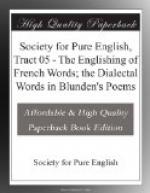10. ‘Of hobby-horses with their starting eyes’. (23)
#Hobby-horse# as a local or rustic name for dragon-fly can have no right to general acceptance.
11. ‘Stolchy ploughlands hid in grief.’ (24)
#Stolchy# is so good a word that it does not need a dictionary. Wright gives only the verb stolch ’to tread down, trample, to walk in the dirt’. The adjective is therefore primarily applicable to wet land that has become sodden and miry by being poached by cattle, and then to any ground in a similar condition. Since poach is a somewhat confused homophone, its adjective poachy has no chance against stolchy.
12. ‘I whirry through the dark’. (24)
#Whirry# is another word that explains itself, and perhaps the more readily for its confusion (in this sense) with worry, see E.D.D. where it is given as adjective and verb, the latter used by Scott in ‘Midlothian’. ’Her and the gude-man will be whirrying through the blue lift on a broom-shank.’ In the Century Dictionary, with its pronunciation hwer’i, it is described as dialectal form of whirr or of hurry, to fly rapidly with noise, also transitive to hurry.
13. ‘No hedger brished nor scythesman swung’. (25)
and
‘The morning hedger with his brishing-hook’. (62)
These two lines explain the word #brish#. O.E.D. gives brish as dialectal of brush, and so E.D.D. has the verb to brush as dialect for trimming a tree or hedge. Brush is a difficult homophone, and it would be useful to have one of its derivative meanings separated off as brish.
14. ’A hizzing dragonfly that daps Above his mudded pond’. (28)
#Hizzing# is an old word now neglected. Shakespeare has
’To
have a thousand with red burning spits
Come
hizzing in upon ’em’.—Lear,
III. vi. 17.
and there are other quotations in O.E.D.
15. #Dap# is used again, ‘the dapping moth’. (45.) This word is well known to fishermen and fowlers, meaning ’to dip lightly and suddenly into water’ but is uncommon in literature.
16. ‘The glinzy ice grows thicker through’. (28)
Author’s glossary explains #glinzy# as slippery. E.D.D. gives this word as glincey and derives from French glincer as glisser, to slide or glide. Glinzy and glincey carry unavoidable suggestion of glint. Compare the words in No. 19. Glissery would be convincing.
17. ‘The green east hagged with prowling storm’. (30)
In O.E.D. #hagged# is given as monopolized by the sense of ‘bewitched’, or of ‘lean and gaunt’, related to haggard. This does not suit. The intention is probably an independent use of the p.p. of the transitive verb ‘to hag’; defined as ’to torment or terrify as a hag, to trouble as the nightmare’.




